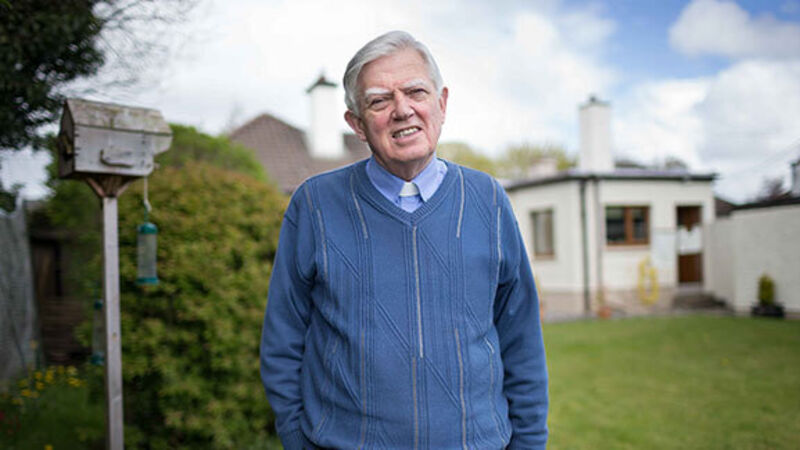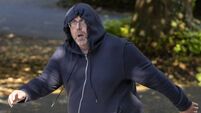Willie Walsh Interview: A hurling crusader

HEN Ger Loughnane seemed to be on death’s door five years ago, he didn’t bother turning to prayer. “I would have been behaving like a complete coward,” he’d say, “if I started begging for mercy after showing no religious tendencies in 50-something years.”
A couple of years later, an old friend of Loughnane’s was also confronted with the prospect of death. All kinds of big questions flashed through the man’s mind either side of been rushed to a Limerick hospital. Was there really an afterlife? What was the meaning of life? Had his own been meaningless and worthless? There was nothing unusual or unnatural about such anguished thoughts, only this friend of Loughnane’s was a bishop.
For Loughnane though, it was that sort of vulnerability that made Willie Walsh the ideal choice of bishop for the Killaloe diocese. He was a man of the people for the people. For a people who’d have had their doubts, who better to serve them than a man who had his own questions too?
Walsh’s name might speak little now to the Tony Kelly generation; when they encounter him, they tend to only see him as a retired bishop and respectfully nod, more out of what that church once meant to their parents than to themselves, and with little idea for what hurling once meant and gave to him and what he once meant and gave to Clare hurling. But Loughnane knows.
“I was so lucky that when I went to St Flannan’s that Willie Walsh and Seamus Gardiner were coaching. They had a new way of coaching: with a ball between three, developing skills and playing games. Every fine evening we were out hurling. They gave great encouragement.”
Long before Loughnane was ever a student in Flannan’s, Willie Walsh was one there himself. He came up from Roscrea where his parents worked a farm and he was reared on going to Thurles and Nenagh to see the likes of the Doyles and Ring. He has only fond memories of those innocent pilgrimages, when after the game you could find your bike or your trap and pony just where and how you’d left them, but he won’t sugarcoat his schooldays in Flannan’s. Food was rationed, a spillover from the world war that had just finished. There were no hot showers. And the climate of the time was even colder. You grew up in fear of the cane and in fear of God.
Walsh would get six of the best as frequently as the average student. Something simple could warrant it, like not knowing his lines of poetry. When he returned to Flannan’s as a teacher and as a priest — a career choice prompted more out of “fear of losing my soul than any pure motive,” he admits in his new book — he soon found himself dishing out the punishment.
“It was a very difficult situation,” he tells you, speaking from the tidy, modest house he now lives in right across the gates from St Flannan’s, and looking fresh for an 81-year-old, especially one who had such a health scare only a few years ago.
“I would always have regarded physical punishment of any person as both demeaning the person receiving it and the person administering it. That time, I was in charge of a study hall of 200 young fellas who naturally were trying to test out this new guy who had arrived; I’d probably have done the same myself as a student. Eventually, it got out of hand and I caught the ringleader and caned him. I felt very badly after, and decided that night that I would never do that again to any student.”
Walsh had come to view the man he served as a loving rather than a judgmental and feared God and he also didn’t see the merits of having a fearful hurler.
“Personally, I never broke a hurley in a dressing room,” says Walsh. “I always thought the emphasis should be on focusing guys before they went out. And I always thought it was desperately important to send fellas out with a sense of confidence and a sense of freedom, that they were going out to enjoy themselves and to win. The evening before a big game, Fr Seamus Gardiner and myself would tell them, if they were playing badly and we didn’t take them off, then it was we who’d lost the game and not them.”
That’s what he feels was the genius of Loughnane. On the big days, most especially the breakthrough finals of 1995, he’d remove any fear or self-doubt. That line and look he famously gave Marty at half-time? Walsh got a personal preview a few days earlier.
“I went over to the last training session, and as bishop just popped my head to say good luck. Loughnane called me over to the corner and stared at me. ‘We’re going to win this All-Ireland on Sunday. Don’t have any doubt about that.’ And I came out of that dressing room saying, ‘Clare are going to win the All-Ireland.’ Because his conviction would rub off on every player.”
That ability to convince players they were capable was something Loughnane might have partly picked up from Walsh, though the retired bishop will make no such claim. “I felt you often had to convince the fella that he was well able,” he says. “You’d be calling him aside, let’s say before a game against The North Mon. ‘You’re marking Teddy McCarthy. Fabulous hurler but there’s a break in him. If you stick with him and hook him and block him, he’ll get frustrated.’”
He and Seamus Gardiner also had a technical knowledge to complement their softer skills. Even to this day, Dónal Óg Cusack is about the only commentator who talks about the concept of a defensive wheel, but All-Ireland winners like Jamesie O’Connor will say they first came across the term way back in the 1980s at Flannan’s. They’d drill it into their players, well, religiously: if one of our backs gets beaten, the nearest guy goes to the man with the ball, and everyone else rotates, like a wheel.
“I’d often say to the corner-back, ‘If you have to go to the wing forward and your own man scores, I won’t be blaming you. I’ll be blaming the full-back who didn’t come to him.’”
Flannan’s had their own famine and frustrations before making the breakthrough. Prior to 1976, the Ennis college hadn’t won a Harty Cup in 17 years. Even a couple of fine teams featuring Loughnane, Johnny Callinan and Colm Honan were beaten in a couple of finals. Then the college went on to win five All-Irelands over the next decade. They were the ones ending up on the right side of close games against the likes of the mighty Mon.
For Clare to gain a similar edge, Walsh appreciates it took a force of nature like Loughnane. Walsh had seen him up close in 1991 with the U21s. Walsh was the manager, Loughnane the coach, the best Walsh had seen. The pace he demanded, and the precision and variety of his sessions; three minutes for this, before moving on to four minutes of this — it’d be the norm now but it was groundbreaking back then, especially for Clare. The following year, Walsh went up to the seniors — Len Gaynor was struggling to find selectors — and Loughnane took over the U21s. A talented Clare side would famously lose to Waterford, prompting county board delegates to oust Loughnane, but a year later as Gaynor again struggled to find senior selectors, Walsh helped rope in Loughnane.
They were going into a team that had been hammered by Tipp in the previous summer’s Munster final and were drawn to play them again in the first round of the 1994 championship. “The two of us vowed if it was the last thing we ever did, that we’d beat Tipp. And we did beat Tipp. But that was our Munster final. We never lifted it again for the final against Limerick.”
A former student of Walsh’s, Jamesie O’Connor, has spoken about how chaotic and dispiriting the mood at half-time was that day. Walsh won’t deny the veracity of such an account. “Oh, we made a complete mess of it,” he nods. “I’ll take responsibility for that, as one of the selectors. We were in a lot of trouble, losing too many positions, but the moves we made were disastrous. We put Seanie McMahon out wing back. We should never have moved Seanie out of the centre. He didn’t have the pace for the wing, and [Mike] Galligan destroyed him. We put Francis Corey centre back. Francis had never played centre back in his life before.”
That would be Walsh’s last game involved with a team. A few weeks earlier the Papal Nuncio had asked to meet with him and request that he become bishop of the Killaloe diocese. Would he feel any sense of regret not being there with Clare in ’95? No; he was delighted, for the county, the team and its Flannan’s contingent. Did he feel any trepidation upon becoming bishop? Absolutely. He made it clear to the Nuncio that evening that he was no crusader on many church teachings.
Long before the divorce referendum was passed in 1995, he was uncomfortable about the church’s unwelcoming stance to people in second relationships. He wanted the church to debate celibacy.
“People would say to me at times that I was brave to say this or honest to say that. But a lot of the time I’d be saying these things and thinking, ‘Oh God, this will bring murder down on me for saying this.’ I’m not one of these people who don’t experience fear when they say something that’s out of line. I wouldn’t have used the pulpit to express my views, I think the pulpit is a very sacred place where people can’t reply to you. But I was very involved in marriage preparation and would have made no secret when talking to couples that I’d be uncomfortable with church teaching in relation to family planning.”
Some of his unorthodoxy stemmed from childhood. He remembers his father attending the funeral service of a friend who was protestant and how he required absolution for such a sin. There’s a wrong there all right, thought Walsh, and his father wasn’t the guilty party.
As bishop, he’d reach out to the traveller community. When there was a housing crisis in Ennis, he’d allow up to a dozen caravans reside on his palace gardens for a year. A traveller who killed his brother would take refuge in his grounds as well before being sentenced to jail. Walsh believed in a compassionate, loving God, not the judgemental one he’d been reared on.
He’d long felt the church should be more tolerant of homosexuality, and though he stopped short of supporting the equality referendum, he would publicly challenge a view from a prominent Vatican figure, a Cardinal Pietro, that the outcome was “a defeat for Christian principles and for humanity”.
“One could hardly look at the celebrations,” Walsh would tell RTÉ last May, “and say it didn’t increase the sum of human happiness.” He was certainly glad to be around to be able to see it. Eighteen months earlier he was rushed to hospital, suffering an aneurysm of the aorta.
“I nearly died. It took a six-hour emergency operation at midnight to save my life. But it took me a long time to come through it. I went through a very dark period in which I lost total confidence in myself and everything and became depressed.
“First of all, I knew that it was quite possible that I was going to die within a short time. I was in very serious pain. I was hardly able to walk. And I was down in myself and questioning my faith and what I did with my life and was it all now just a ball of smoke.
“I’d say after a year I got back my confidence. But I don’t have the same certainties now that I had when I was younger. There would be doubts there.”
Doubts like?
“Like could it all end with a hole in the ground? I don’t think it will, but I would have questions marks. It’s not a kind of a blind faith anymore. But to me life doesn’t make any sense if it ends with a hole in the ground. For one thing, it’s desperately unfair, the way we live and then the way half the world lives in starvation and everything. And the whole question of pain and suffering and where’s God in all that; I’d be asking all those questions. But I can live with any uncertainty that’s there now and say ‘You know, life has been worthwhile.’ And I don’t have any regrets at this stage.
“I could have done things better. I would have very strong feelings about justice and the way we treat people, especially at the bottom of the ladder. I think I would have done more on that issue.”
Reflecting on such issues and thoughts prompted him to write his book, which was launched last week. He’s in demand on the publicity circuit but he’ll take a break to head to Thurles for the league final, just as he does most Clare matches.
The game is unrecognisable from the one he coached, and he’ll admit that since Loughnane and Davy after him brought Clare to the promised land, he couldn’t be sure he’d shout against his native Tipperary were the two counties to clash in a Munster final. He softly laughs; when he coached in Flannan’s, they would sometimes have internal games between the Clare locals and Tipp boarders. The school president had to put a stop to it, they’d get so heated. It was nearly like when Loughnane himself was coaching Clare!
The rivalry’s not quite as intense as that now, and as much as his love for his native shore may be resurfacing, Clare will always be a part of him. He remains the last manager to guide Shane O’Donnell’s club Eire Óg to a county title. At Easter, he went on holidays to Spain with a few members of that team as well as Tubber’s Enda O’Connor who was on the last Clare team to win a league title in ’78.
He’ll always have friends in Clare, Clare will always have a friend in him.













